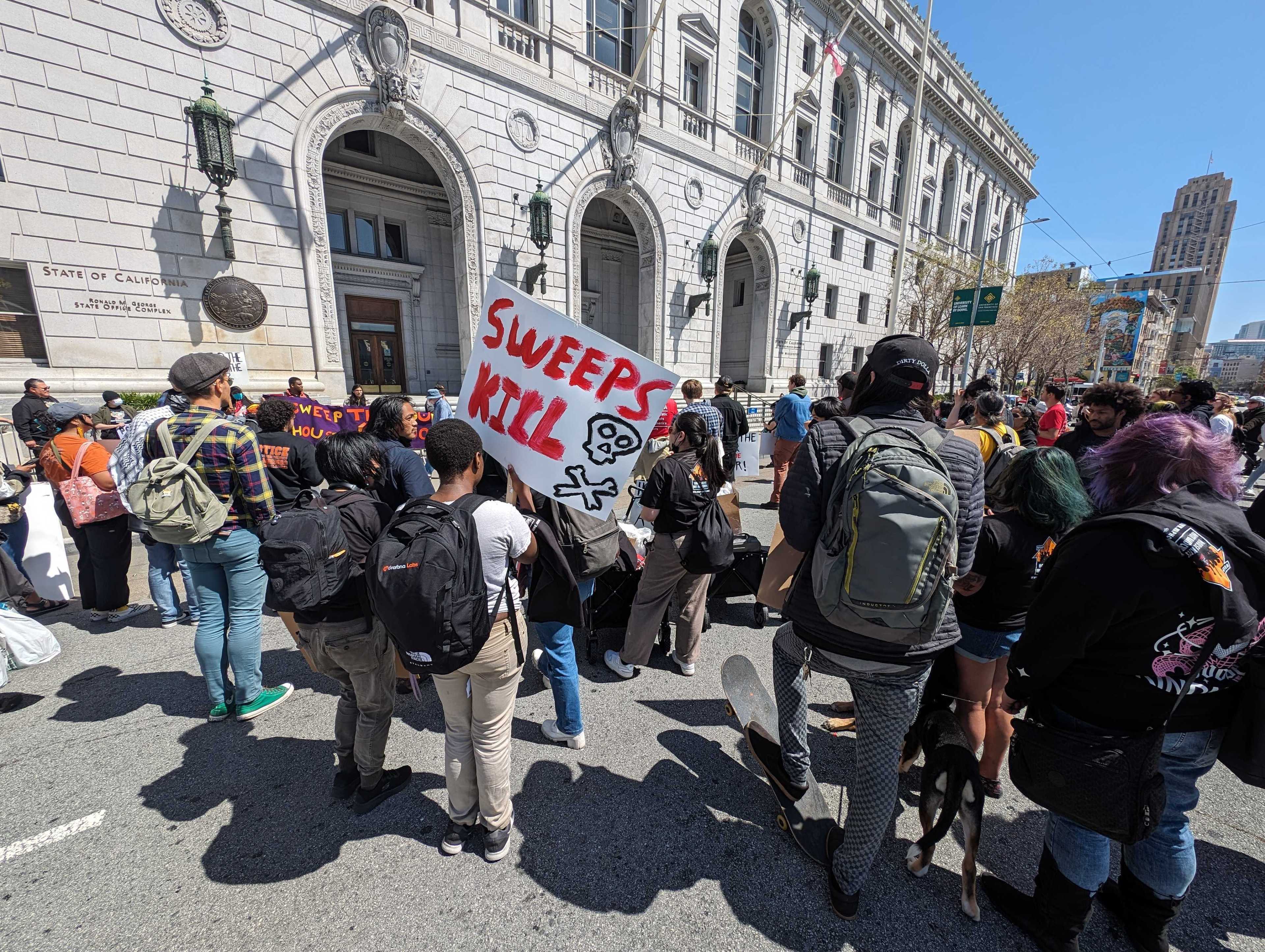A U.S. Supreme Court case that could redefine San Francisco’s homelessness policies sparked protests downtown on Monday morning as justices in the country’s capital heard oral arguments in Grants Pass vs. Johnson.
Several dozen protesters helped to block off McAllister Street between Polk and Larkin streets, holding banners that said "sweep the court" and "sweeps kill.”
“The court is deciding whether it's OK to arrest people for being born homeless,” said the Coalition on Homelessness’ Jennifer Friedenbach, whose organization sued San Francisco in 2022 over its encampment sweeps. “That is so rough. And we're here fighting. We are fighting to get people off the streets and into safe and dignified housing.”
The court case, which shapes homelessness policy in California and eight other states across the western U.S., traces back over a decade to the southern Oregon town of Grants Pass. In 2013, the city passed a series of laws prohibiting the use of blankets, pillows or cardboard boxes while sleeping outside.
After a group of homeless residents sued, the Ninth Circuit Court of Appeals barred the Oregon city from enforcing its ordinance, asserting that it violated the “cruel and unusual punishment” clause in the Eighth Amendment.
At the heart of Monday’s debate was the issue of whether such ordinances punish someone’s conduct, like camping outside, or someone’s status of being without a home.
The high-profile Supreme Court hearing drew San Francisco activist and tech executive Garry Tan, who has been a vocal critic of San Francisco's homelessness policies.
I came to DC today to watch Supreme Court deliberations on the Grants Pass case, which will determine whether or not and how cities can help homeless people get off the streets and into shelters.
— Garry Tan (@garrytan) April 22, 2024
It was an honor to attend with @SacCountyDA Thien Ho and we ran into @CALtGovernor… pic.twitter.com/j6XAJFCsTQ
Petitioners in the case argued against the Ninth Circuit’s ruling, contending that the federal court had overstepped.
“Cities are struggling to apply arbitrary shifting standards in the field,” said attorney Theane Evangelis before the justices. “This court should reverse the Ninth Circuit's failed experiment, which has fueled the spread of encampments while harming those it purports to protect.”
In San Francisco, homelessness has long defined the political dynamic around housing and public safety, and a moderate movement in recent years has called for more aggressive action on behalf of the local government to impose stricter rules on encampments.
A count by the city’s Healthy Streets Operations Center at the end of February found the city had 385 tents, though some have questioned the accuracy of those exercises.
At the Supreme Court, attorneys fighting against Grants Pass argued the Oregon city’s laws were effectively criminalizing homelessness—or just pushing the problem under the rug.
“The ordinances, by design, make it physically impossible for homeless people to live in Grants Pass without facing endless fines and jail time,” said Kelsi Corkran, who serves as Georgetown Law’s Supreme Court Director at the Institute for Constitutional Advocacy and Protection. “All the ordinances do is turn the city’s homelessness problem into someone else’s problem by forcing homeless residents into other jurisdictions.”
The case could have impacts on the ground in San Francisco, where a federal magistrate judge earlier this year paused the Coalition on Homelessness’ lawsuit until the U.S. Supreme Court makes a decision. Both San Francisco and Gov. Gavin Newsom have called for cities to have more flexibility when it comes to clearing encampments.
The coalition’s lawsuit was filed in September 2022 and claimed that San Francisco was violating the law by destroying homeless encampments without providing alternative shelter. There is currently a preliminary injunction against the city that limits it from enforcing laws against sitting, lying or lodging in the street.
Attorney Nisha Kashyap, who is representing the coalition in the lawsuit, said she felt the questions by the Supreme Court justices on Monday morning suggested that the outcome may be up in the air.
“What this case is about is very narrow—and very common sense,” said Kashyap after the oral arguments were heard. “This isn’t a case that falls clearly along political lines.”
But attorney Erik Jaffe said Monday that he expects the court to overrule the Ninth Circuit’s ruling in a 6-3 or 7-2 vote.
“The way it's been playing out in the Ninth Circuit and federal courts, every time cities under the circuit court’s jurisdiction try to move people or find alternatives for people sleeping outside, all of the places that cause problems, the courts say the alternatives aren’t good enough,” said Jaffe, who helped file an amicus briefing in support of the justices overturning the ruling. “Which effectively stops them from doing anything. Cities can’t exist that way. And I don’t think the constitution demands that they do.”
A decision by the high court is expected at the end of June.
